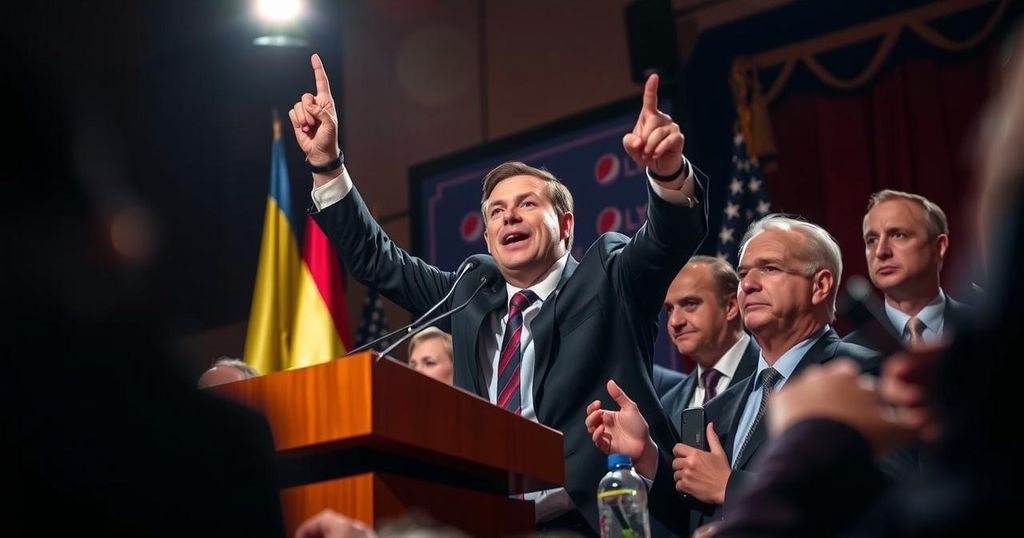World news
AFRICA, CAL, CALIN GEORGESCU, ELECTIONS, ELENA LASCONI, EUROPE, EUROPEAN UNION, GEORGESCU, GOVERNMENT, LASCONI, MARCEL CIOLACU, NAMIBIA, NATIONAL ASSEMBLY, PARLIAMENTARY SEATS, ROMANIA, SAVE ROMANIA UNION, SDP, SNAP ELECTIONS, SOCIAL DEMOCRATIC, SOCIAL DEMOCRATIC PARTY, STAR, UK, UKRAINE
Ethan Kim
0 Comments
Romania’s Governing Party Expected to Retain Majority Amidst Far-Right Gains
Romania’s governing Social Democratic Party is likely to maintain a parliamentary majority despite gains by far-right parties, most notably the Alliance for Uniting Romanians. Voter turnout was historically high, exceeding 52.3%. The elections reflect a significant rise in nationalist sentiment, embodied by presidential candidate Calin Georgescu, who has leveraged social media amidst controversial positions regarding Ukraine and Russia.
In Romania, the governing left-wing Social Democratic Party (SDP) appears poised to secure its parliamentary majority in the recent general elections, despite a notable resurgence of far-right sentiments. Early results indicate that the SDP garnered approximately 24 percent of the vote, while the far-right Alliance for Uniting Romanians achieved around 18 percent. Concurrently, the National Liberal Party, a coalition partner of the SDP, secured 14 percent of the ballots, with the reformist Save Romania Union following at 10 percent.
Significantly, voter turnout for this election exceeded 52.3 percent, marking the highest engagement in two decades, with over 9 million voters participating. However, comprehensive results are pending, particularly from the Romanian diaspora, which is expected to favor conservative candidates. The rise of far-right factions reflects an ongoing trend of growing nationalism and skepticism towards Romania’s established pro-European Union and pro-Ukraine policies, especially as the nation continues to support Ukraine amid the Russian invasion.
The election’s context is further highlighted by the unexpected popularity of far-right presidential candidate Calin Georgescu, who advanced despite predictions of a lackluster performance. Focusing his campaign on nationalist rhetoric and leveraging social media, particularly TikTok, Georgescu has positioned himself against Ukraine’s involvement in the ongoing conflict. His criticism of Ukraine’s sovereignty, alongside controversial remarks regarding Russian leadership, raises concerns about Romania’s political direction. His opponent, reformist candidate Elena Lasconi, warns of the broader implications of electing illiberal leadership, framing it as a struggle to preserve Romania’s democracy against authoritarian influences.
The political landscape in Romania is currently characterized by a significant shift towards nationalism and populism, marked by the electoral gains of far-right parties amid widespread public support. Romania’s governing coalition, predominantly led by left-leaning ideologies, faces challenges from ultra-nationalist factions seeking to reshape national policy, particularly concerning Romania’s stance toward the European Union and its support for Ukraine. This election highlights a pivotal moment for Romania, as the potential return to a more nationalist governance model threatens existing democratic frameworks and alliances, especially considering Romania’s strategic position in the region and its historical ties to both Russia and Ukraine.
In conclusion, Romania’s recent general elections underscore a complex interplay between established political factions and the rising influence of far-right parties. The capacity of the governing Social Democratic Party to maintain its majority is counterbalanced by a considerable voter shift towards nationalist sentiments, exemplified by the rise of Calin Georgescu. As Romania navigates its political future, the implications of these electoral outcomes resonate beyond domestic policy, potentially affecting the country’s international alliances and commitments, particularly in relation to the European Union and neighboring Ukraine.
Original Source: www.aljazeera.com




Post Comment